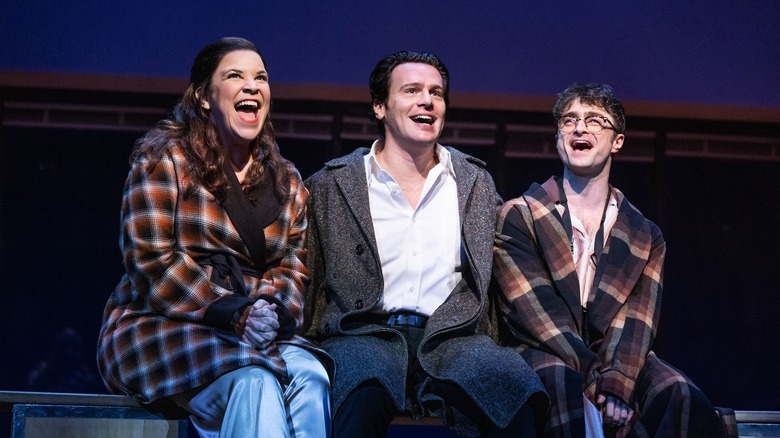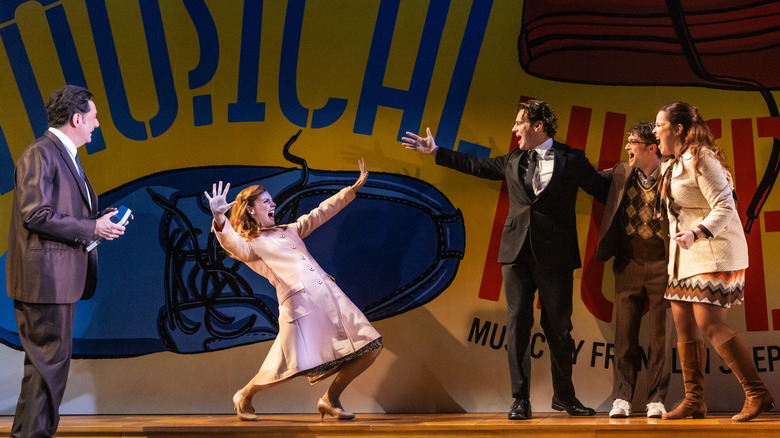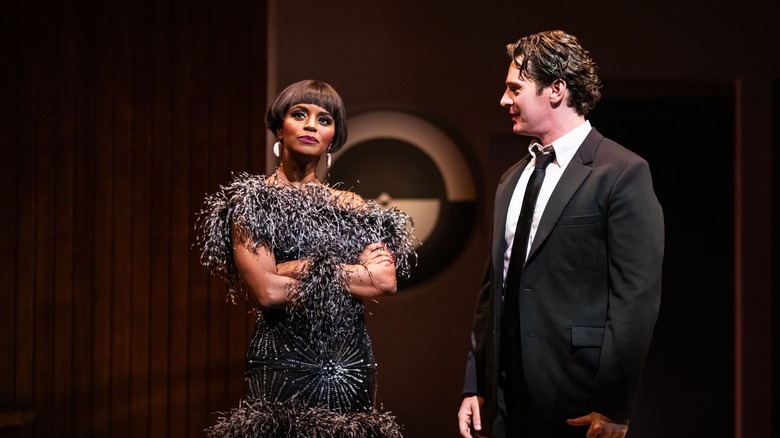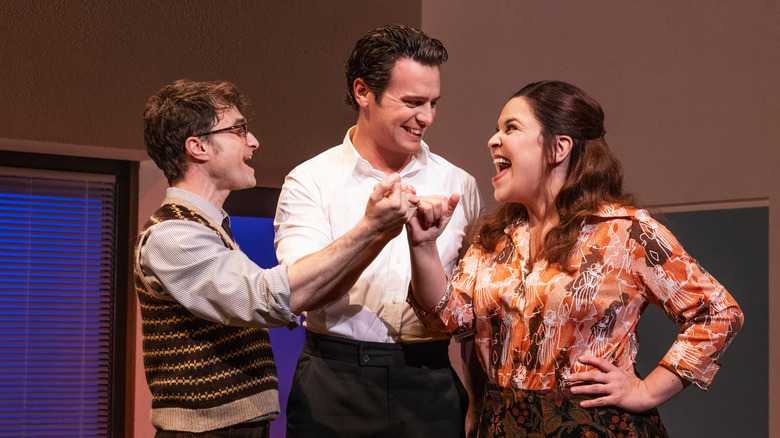Merrily We Roll Along Review: Daniel Radcliffe And Jonathan Groff Lead The Revival Of Stephen Sondheim's Musical
Irony dwells in the bones of "Merrily We Roll Along," a musical that plays backward in time. The 1981 sinking of the original Broadway production of "Merrily We Roll Along" is a chaos best told by the documentary "Best Worst Thing That Ever Could Have Happened." The critics and audience were reportedly baffled by the reverse chronological storytelling and director Hal Prince's purposefully amateurish methodology, which casts high schoolers and young adults playing fortysomethings aging down to twentysomethings. It closed down after 44 previews and 16 performances. The loss demoralized the creatives so much that lyricist-composer Stephen Sondheim and Prince — mavericks who birthed successes like "Company" and "Sweeney Todd" — halted their collaboration for years. This short-lived run underscores the musical's themes: friendships breaking up and showbiz realities thwarting artistic plans.
Away from Prince's high-schoolish shell, major productions have repackaged "Merrily." This material also turned out to be a fitting endeavor for filmmaker Richard Linklater, shooting his movie adaptation for 20 years with onscreen aging, a la "Boyhood." Having once acted in "Merrily," director Maria Friedman undertook the task of a digestible staging. Friedman's version had a 2012 London-based premiere at Menier Chocolate Factory before a West End transfer (that was live-captured for cinematic screenings). Her vision ended up off-Broadway at the 198-seat New York Public Workshop Theatre in late 2022, regaled with a starry trio: The "Spring Awakening" dreamboat Jonathan Groff, Elphaba alum Lindsay Mendez, and fresh-out-of-"Weird" Daniel Radcliffe. And the stars still align for them upon its transfer to the Broadway venue, more than four decades after the original production's sinking.
How did we get to be here?
Adapting the 1934 play by George S. Kaufman and Moss Hart, George Furth's script begins in 1976 and "ends" in 1957. Friedman frames "Merrily" as the flashbacks of Franklin Shepard (Groff, with an instinct for humanizing Frank even at his worst), a lonely fortysomething movie producer and former composer. Though oozing in his wealth and connections, Franklin grits his teeth and pretends that he's basking in his successes. However, tensions run high as his second wife, the Broadway actress Gussie Carnegie (Krystal Joy Brown), and his theatre critic friend, Mary Flynn (Mendez), storm out on him. As the musical rolls back in time scene by scene, he reflects on the relationship and career choices that severed him from Mary and his former lyricist-playwright collaborator, Charley Kringas (Radcliffe). Thanks to Kai Harada's sound design and Joel Fram's music direction (especially in an era where musical sound mixing can be suspect), a crisp-sounding chorus delivers aphorisms in the show's transition numbers, spelling out the years and Frank's questions: "How did you get to be here? What was the moment?"
Soutra Gilmour's set design adheres to simplicity: an unremarkable white wall of blue-backdropped windows that hint toward Franklin's pursuit of hollow opulence. The kinks have been resolved since its off-Broadway run. For example, thanks to Amith Chandrashaker's dutiful lighting, hyper-shiny tassels no longer derail the one-two gut punch of "Not a Day Goes By" (Reprise). Die-hards might bristle at a "logical" — perhaps middlebrow — staging of "Merrily," but Friedman's grounded approach hits the right notes with Sondheim's chromatic lyricism, singing a tune that feels universal on many wavelengths. The chemistry between Groff, Radcliffe, and Mendez is easy wind in the sails, their triptych bond knitted together by Tim Jackson's corny choreography that accents their quirks (such as the comical manner in which Radcliffe drags his feet as Mendez accosts him into a shoulder-to-shoulder dance). When Frank's former friendships dance into view, we mourn for what they had lost.
A good thing going
The musical ensures that we fall hard for Franklin's friends and understand their needs. Charley has been exhausted by Frank dragging him into profitable commercial art, sidestepping and delaying a personal, politically expressive project between them. Accented through Gilmour's costume choices, the immediacy of Frank and Charley's breakup owes plenty to a physical juxtaposition: Radcliffe's sweatered scrawniness next to Groff's broad-shouldered maintenance of appearances. Pair Groff and Radcliffe in a room together and can we picture their relationship before they are shown in social spaces: Frank as the charismatic, business-savvy frontman shaking hands with connections, as he hooks Charley into deals against his will. Charley is not blessed with Frank's confidence, so hard nos don't come gracefully to him. The rollback in time equips an adept Radcliffe with the showstopping "Franklin Shepard Inc." in scene 2, a risky placement for an eleven o'clock meltdown where Charley stomps on all the land mines in his working relationship with Frank. So prepare the tissues in Act 2, eons before their breakup, when a younger Charley sings "Good Thing Going," as he exchanges meaningful glances with Frank over the piano.
Mendez breathes life into Mary, hopelessly in love with Frank. The musical introduces her in a biblically drunken fury that contrasts with the goofball spirit of her youth. Ultimately, Mary operated as the lynchpin between Charley and Frank. For a time, she had the magic to raise her hand in a magnetic pinkie promise to lure her bickering boys back into mutual, if not reluctant, joviality through the buoyant "Old Friends." Furth's script shows a too-scarce interest in her relationship to her career compared to Franklin's and Charley's, but Mendez colors in those blank spaces with disillusionment.
Some love will wear away
Among Frank's regrettable decisions is his extramarital affair-turned-marriage with the snobby Gussie, the actress once married to Frank's producer (a charismatic Reg Rogers). Her character seems to be a scriptural paradox, somehow both textually rich and a dated soapy antagonist, her purpose being to tempt Frank away from his stable relationships and better instincts. Off-Broadway, Brown's Gussie resembled more of Frank's ideas of prosperity and a sweet-talking devil on his shoulder, rather than her own human being engaging with her own perspective. Though Brown can't fix the soapy villainy in the script, it's a pleasure to note that she has unfolded dimensions in Gussie's Broadway evolution, supplying human and performative purpose to her vanity as she schools Frank in making necessary connections with the moneyed crowds — the "Blob" — to propel his career.
But before Gussie, there was sweet Beth (Katie Rose Clarke), Franklin's betrayed first spouse. Clarke has dialed down her (deliberately for impact) wobbly "Not a Day Goes By," but she hasn't figured out its build (subject to change). But that's a quibble against her exuberant bubbliness as a younger revue performer alongside Frank and Charley. Once we understand that she was a former fourth musketeer who made sacrifices for Franklin's career, we retroactively mourn her absence in the future.
Breathe it in
This is a story with an unhappy ending where joyful early chapters are counterbalanced by dramatic irony. And yet, not one second in this musical registers as a cynical exercise. It holds our hand during the trio's lowest points while emboldening us to treasure the sparks of their youth, before they crumbled part, before the symptoms of their downfall, before they were emerging artists who had to be told to write a hit and hummable songs to make it in showbiz, before they were taking up gigs to make ends meet while balancing their artistic pursuits.
As they become younger, Frank, Charley, and Mary de-age into starry-eyed dreamers who swear to keep their flames lit forever. But roads bend and dreams will shapeshift over the years due to realities and unheeded follies. A good production of "Merrily We Roll Along" ensures that the stargazing "Our Time" finale packs that wallop. Embracing its newly acquired Broadway scope, the musical concludes with stars blazing upon the ceiling of the Hudson Theatre. Only by reflecting upon the old times can Frank see those stars again.
"Merrily We Roll Along" is playing on Broadway at the Hudson Theatre. The show is scheduled to run until March 24, 2024.




